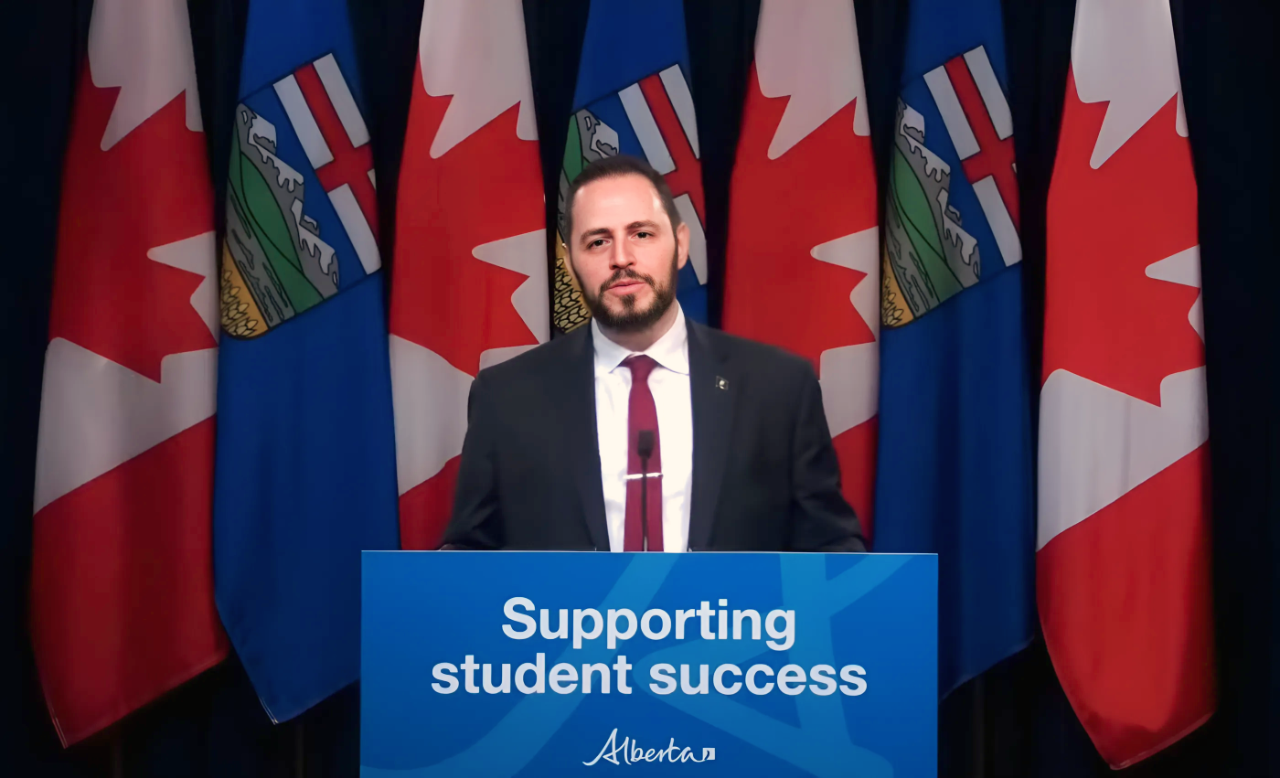Minister of Education Demetrios Nicolaides held a press conference today to unveil the updated curriculum for kindergarten to grade six social studies in Alberta. The event, attended by various stakeholders including educators, parents, and media representatives, highlighted the government’s commitment to providing students with a robust and modernized education that prepares them for the challenges of the future.
Acknowledging the rapidly evolving world, Nicolaides underscored the necessity of updating the curriculum to equip students with the skills and knowledge essential for success. He outlined the extensive engagement process undertaken, which spanned eight months and involved gathering feedback from thousands of Albertans and hundreds of education partners across the province.
The minister highlighted the invaluable feedback received from Albertans during the consultation process. Positive responses commended the increased emphasis on indigenous peoples and histories, the enhanced focus on democracy and citizenship, and the inclusion of content promoting diversity and responsible citizenship. However, concerns were also raised regarding content load, critical thinking skill development, and the need for greater inclusivity.
In response to the feedbacks, Nicolaides outlined several key changes implemented in the revised curriculum:
- Content Redistribution: Some topics, such as taxes, have been shifted to later grades to ensure appropriateness and depth.
- Content Load Reduction: Concerns about overwhelming content in certain grades, like grade 4, have been addressed by reducing the volume of material.
- Enhanced Diversity and Inclusion: Additional perspectives from First Nations, Métis, Inuit, and Francophone communities have been incorporated. Moreover, content addressing racism, anti-racism, anti-Semitism, and Islamophobia has been added to foster understanding and inclusivity.
- Focus on Critical Thinking: The curriculum now places greater emphasis on developing critical thinking skills, with fewer outcomes centered on recall and memorization. This shift aims to empower students to analyze, evaluate, and create, fostering lifelong learning habits.
Looking ahead, Nicolaides outlined the plan for piloting the new curriculum, inviting all school boards to participate in the piloting process starting September of this year. The piloting period, scheduled to run until June 2025, will provide valuable insights into the effectiveness of the curriculum in diverse classroom settings. School boards will have flexibility in determining their level of involvement, with dedicated funding and resources allocated to support piloting efforts.
During question and answer session, several questions centered on the concerns raised by curriculum development specialists and academics regarding the initial draft of the curriculum. Minister Nicolaides acknowledged the feedback, noting that while some concerns were specific to content in junior high and high school, others focused on the need to strengthen critical thinking skills and reduce the emphasis on rote memorization. In response, significant revisions were made to the curriculum, with fewer outcomes focused on lower-level thinking and increased emphasis on higher-order thinking skills.
Concerns from parents and educators about the curriculum’s alignment with their expectations were also addressed. Minister Nicolaides emphasized the government’s commitment to inclusivity and diversity, highlighting the extensive consultation process undertaken to gather feedback from Albertans. He reiterated the importance of listening to diverse viewpoints and incorporating them into the curriculum development process, noting that feedback from over 13,000 respondents prior to drafting the curriculum informed key decisions.
Questions regarding the piloting phase and the timeline for curriculum implementation shed light on the practical aspects of rolling out the new curriculum. Minister Nicolaides explained the rationale behind inviting school boards to participate in piloting, emphasizing the need for diverse perspectives and classroom experiences to ensure the curriculum’s effectiveness. He outlined the piloting timeline, emphasizing flexibility for school boards and the government’s commitment to providing resources and support throughout the process.
Questions regarding the politicization of the curriculum prompted Minister Nicolaides to reiterate the government’s commitment to providing students with an unbiased education. He emphasized the importance of presenting information objectively and fostering critical thinking skills, noting that the curriculum aims to equip students with the tools to form their own conclusions and engage in informed discourse.
Inquiries about the curriculum’s approach to diversity, equity, and inclusion prompted Minister Nicolaides to discuss specific content addressing racism and the government’s efforts to combat discrimination. He highlighted the curriculum’s focus on educating students about racism, its forms, and strategies for combating it, underscoring the importance of fostering a supportive and inclusive learning environment for all students.
The minister reassured educators that the government is committed to providing the necessary resources and support for successful curriculum implementation. Teachers will receive comprehensive training and access to learning and teaching resources aligned with the new curriculum. Additionally, a feedback mechanism will be in place to gather insights from teachers and stakeholders, ensuring continuous improvement throughout the implementation process.
As Alberta’s updated social studies curriculum enters the piloting phase and eventually becomes mandatory in schools, it will be intriguing to observe the reactions and insights of teachers. Even seemingly small changes in curriculum can significantly impact the teaching environment and the materials educators rely on. Teachers may need to adapt their lesson plans, resources, and instructional methods to align with the revised curriculum, posing challenges but also opportunities for innovation and growth. Their experiences and feedback will be invaluable in ensuring the successful implementation and effectiveness of the updated curriculum, ultimately shaping the educational journey of Alberta’s students for years to come.

